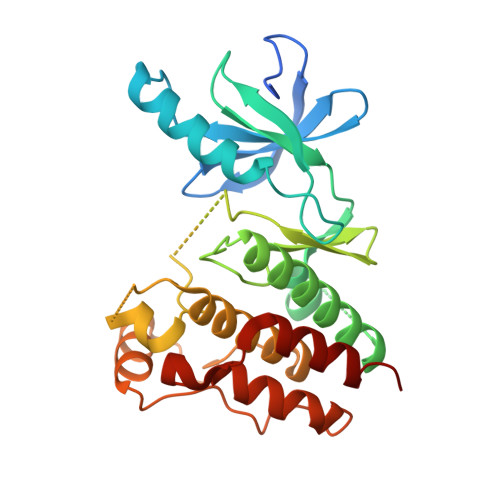Clinical efficacy of a RAF inhibitor needs broad target blockade in BRAF-mutant melanoma.
Bollag, G., Hirth, P., Tsai, J., Zhang, J., Ibrahim, P.N., Cho, H., Spevak, W., Zhang, C., Zhang, Y., Habets, G., Burton, E.A., Wong, B., Tsang, G., West, B.L., Powell, B., Shellooe, R., Marimuthu, A., Nguyen, H., Zhang, K.Y., Artis, D.R., Schlessinger, J., Su, F., Higgins, B., Iyer, R., D'Andrea, K., Koehler, A., Stumm, M., Lin, P.S., Lee, R.J., Grippo, J., Puzanov, I., Kim, K.B., Ribas, A., McArthur, G.A., Sosman, J.A., Chapman, P.B., Flaherty, K.T., Xu, X., Nathanson, K.L., Nolop, K.(2010) Nature 467: 596-599
- PubMed: 20823850
- DOI: https://doi.org/10.1038/nature09454
- Primary Citation of Related Structures:
3OG7 - PubMed Abstract:
B-RAF is the most frequently mutated protein kinase in human cancers. The finding that oncogenic mutations in BRAF are common in melanoma, followed by the demonstration that these tumours are dependent on the RAF/MEK/ERK pathway, offered hope that inhibition of B-RAF kinase activity could benefit melanoma patients. Herein, we describe the structure-guided discovery of PLX4032 (RG7204), a potent inhibitor of oncogenic B-RAF kinase activity. Preclinical experiments demonstrated that PLX4032 selectively blocked the RAF/MEK/ERK pathway in BRAF mutant cells and caused regression of BRAF mutant xenografts. Toxicology studies confirmed a wide safety margin consistent with the high degree of selectivity, enabling Phase 1 clinical trials using a crystalline formulation of PLX4032 (ref. 5). In a subset of melanoma patients, pathway inhibition was monitored in paired biopsy specimens collected before treatment initiation and following two weeks of treatment. This analysis revealed substantial inhibition of ERK phosphorylation, yet clinical evaluation did not show tumour regressions. At higher drug exposures afforded by a new amorphous drug formulation, greater than 80% inhibition of ERK phosphorylation in the tumours of patients correlated with clinical response. Indeed, the Phase 1 clinical data revealed a remarkably high 81% response rate in metastatic melanoma patients treated at an oral dose of 960 mg twice daily. These data demonstrate that BRAF-mutant melanomas are highly dependent on B-RAF kinase activity.
- Plexxikon Inc., 91 Bolivar Drive, Berkeley, California 94710, USA. gbollag@plexxikon.com
Organizational Affiliation:

















